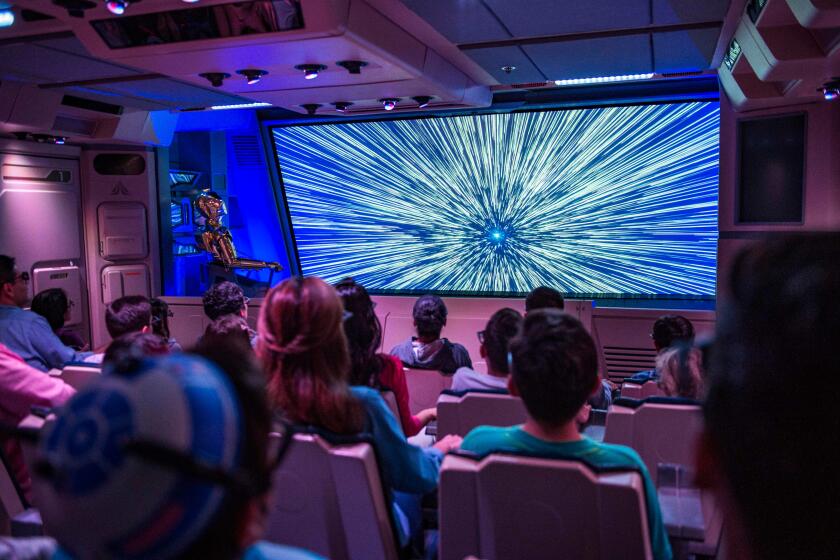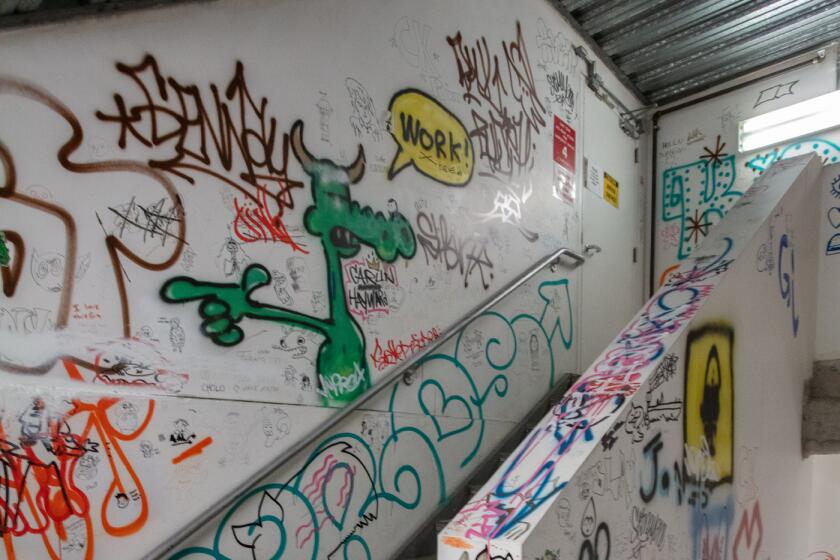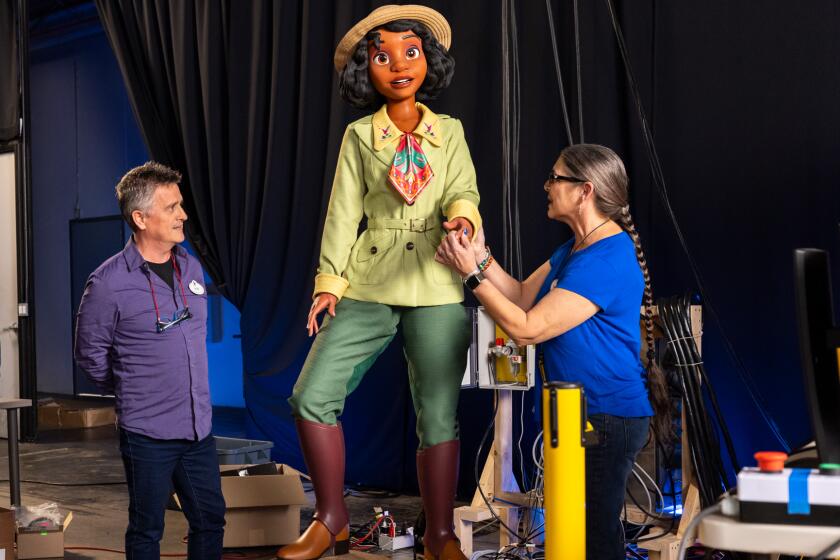IndieCade shows that the whole world is a game platform
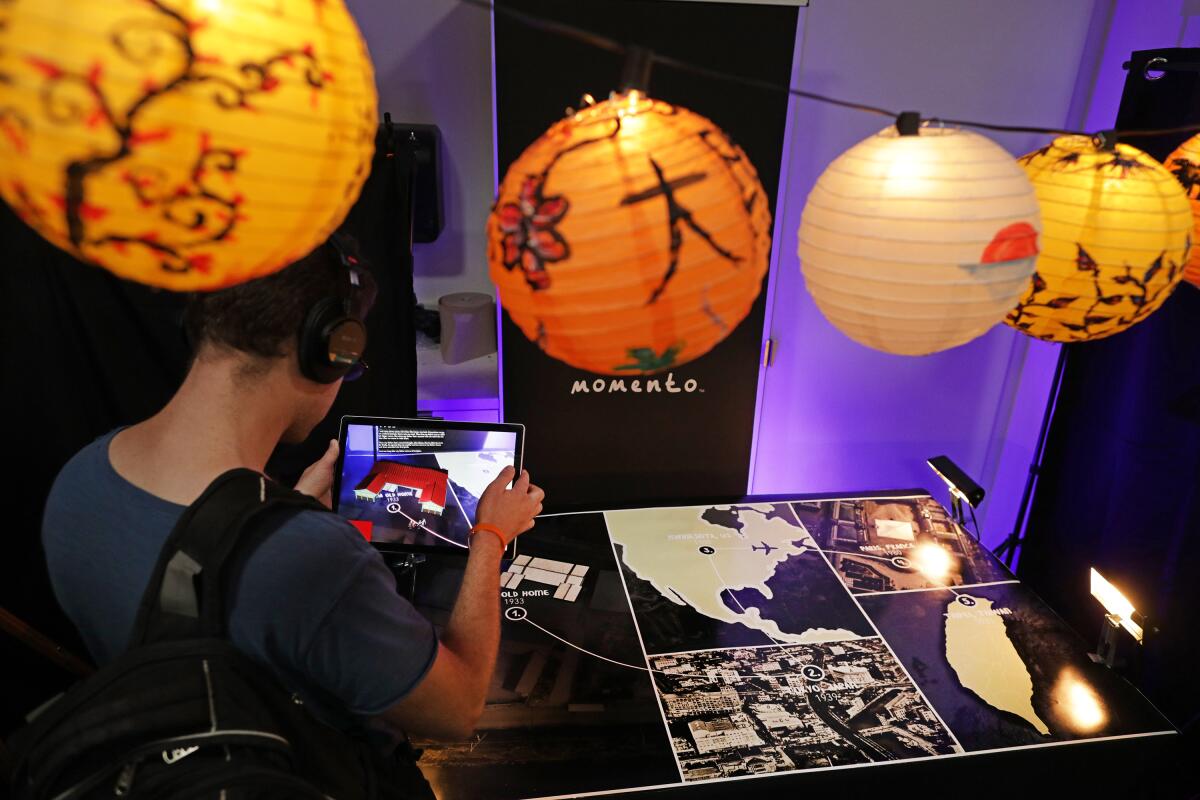
At the cliffhanger end of the demo for “ARBox,” an in-development augmented-reality game that uses a mix of digital and physical objects to allow for escape room-like experiences in our home, players were given a choice: Join a magic revolution and risk it all or pledge allegiance to a corporation and opt for the promise of security. The cost? A life without sorcery.
Earlier this year at the Electronic Entertainment Expo, the gaming industry’s largest North American trade show, most of those who tested the experience played it safe and put their trust in a corporation. At IndieCade, however, an annual independent-focused game event that concluded Saturday in Santa Monica, the votes were unanimous: Join the magic rebellion.
No real surprise that IndieCade attendees would favor a more autonomous route. For more than a decade, IndieCade has showcased what’s underground, what’s next and what’s important in interactive storytelling. Perhaps more vitally, IndieCade puts the emphasis on individual developers, highlighting gaming’s idiosyncratic voices who believe play is a language as much as it is a tool for a medium.
After all, play increasingly surrounds us as “immersive” has become a buzzword used to describe spaces as varied as meticulously detailed restaurants to Instagram museums to theater, and IndieCade touched on everything from interactive productions — the bad date experience that is “Red Flags” — to the large-scale, theme park-influenced art spaces of Meow Wolf, open in New Mexico but coming soon to Denver and Las Vegas.
At this year’s IndieCade, games try to teach us how to be better people
IndieCade makes room too for academic experiments and do-it-yourself projects, but in its 12 years, the event has also subtly carved a new path for games. The recently released mobile subscription service Apple Arcade, for instance, is loaded with IndieCade titles current and former, be it the wacky “What the Golf?,” the literary puzzle game “Dear Reader,” the reflective “Where Cards Fall” or the narrative examination of the gig economy that is “Neo Cab.”
And yet the contrasts between IndieCade and the mainstream game industry felt especially pronounced last week, one in which Southern California game giant Activision Blizzard faced heat for the suspension of an esports player who expressed support for the pro-democracy demonstrations roiling Hong Kong. At IndieCade, games embrace, reflect and aim to discuss the world we live in rather than try to shut it out.
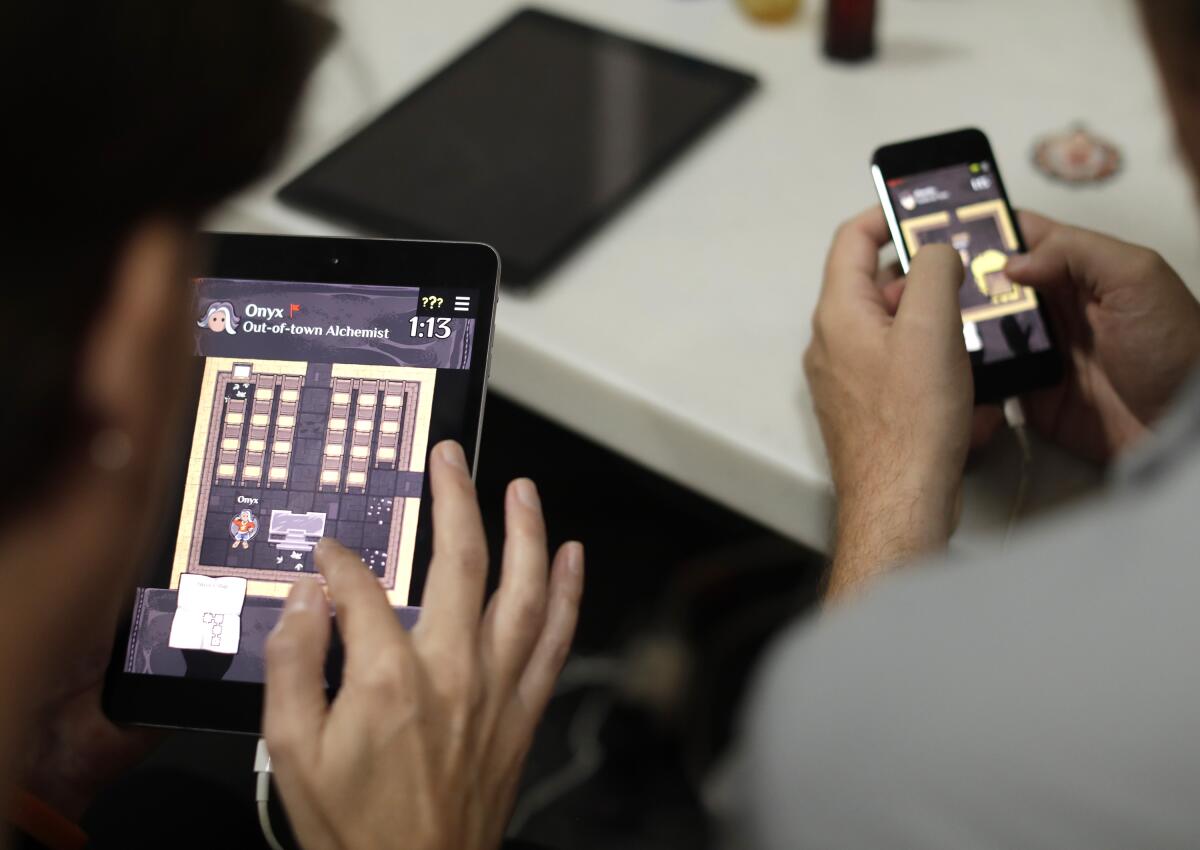
Beyond “Neo Cab,” for instance, there was “Liberated,” a living comic book in which democracy slowly devolves into authoritarianism. As characters run through panels, billboards flash their credit score, showing a populace paralyzed by its debt. Both “Headliner: NoviNews” and “The Occupation” took differing approaches to journalism and the spread of information — or disinformation. “The Occupation” unfolds as a time-sensitive thriller in which controversial laws that will erode civil liberties and stoke anti-immigrant fervor are in the hands of those shaping the government’s narrative. “Headliner: NoviNews,” meanwhile, focuses on choosing headlines and staying one step ahead of an administration that increasingly may view the media as an enemy.
The developers of “Co-opoly” are encouraging players to track down two copies of “Monopoly,” preferably at your local thrift store, and then convert them — stickers are available for printout on the game’s site — into a game that questions capitalism via players cooperatively battling developers aiming to replace affordable housing with generic luxury condos for the rich. “Do Not Feed the Monkeys” takes a more humorous look at our cultural climate. The game, available for home computers, questions why we’ve so willingly allowed potentially invasive tech into our lives, tasking the player with spying on a cast of characters while also striving to reach an eroding middle class.
Don’t, however, mistake IndieCade as solely a place for seriousness.
On Saturday evening, the fest shifted its focus slightly to group participation, emphasizing games that seek to help us connect with strangers and break down the social barriers that naturally become ingrained in us as we leave childhood. Check “Hellcouch,” a game that turns a sofa into a controller. Sit on it and discover that said couch is possessed by a demon, one that sounds a little like a heavy metal vocalist, and it’s the job of the player and two others to perform a ritual — sit and stand and make sure each participant doesn’t miss a demon signal — to unleash the monster within.
A bit ridiculous, yes, but Carol Mertz, who developed the game with Francesca Carletto-Leon, doesn’t lug a couch around the country just for kicks. While Mertz admits the game started as a joke, the reason it commanded long lines at IndieCade was likely because “Hellcouch” finds ways to bring people together.
“We got really excited about the idea of exploring what it means to interact with other people on sofas, in general, and in public spaces,” Mertz said. “Getting people to sit next to each other is actually sometimes a challenge, like encouraging people to get close. What could we do to design something that would encourage people to forget about that weirdness?
“Doing something physical like ‘Hellcouch’ is a really cool way of bringing people together,” Mertz added. “That’s why I like to design tabletop games and card games as well. Sharing a space with each other is something that I feel like we do so infrequently.”
Using play to erase whatever gap it is that prevents people from connecting was an underlying theme of this year’s IndieCade. It was present in the heart-achingly thoughtful “Ama’s Momento,” which combines virtual and augmented realities with room-scale projections to tell the story of Yoko Kung, a grandmother of one of the developers, and her lifelong love and quest to champion Taiwanese art.
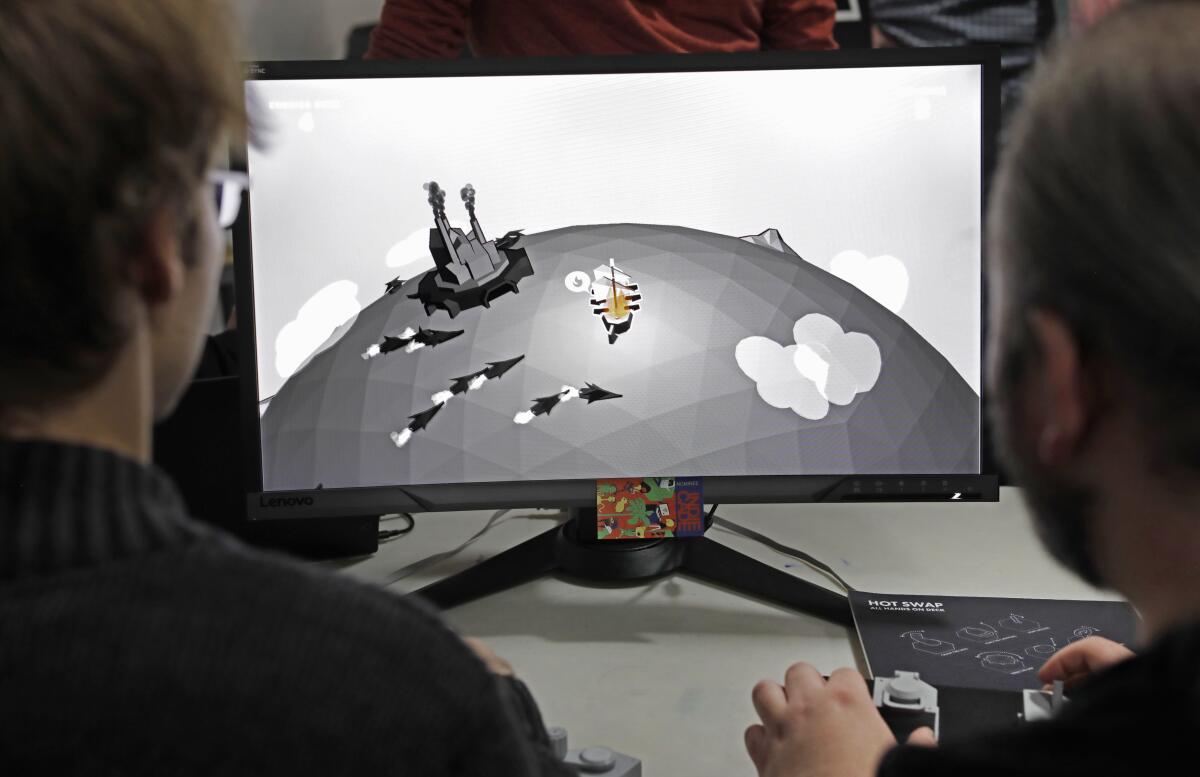
Players could track Kung’s journey via a world map that sprung to life, and then later, in virtual reality, walk around the environments that comprised her journey. The development team hopes it’s a way for cultural institutions to tell personal stories, but it was easy to envision a smaller-scale version becoming the equivalent of the family slide projector of the future; instead of looking at old photos, we walk in them.
Thinking of play, however, as a communicative tool is still something of an experiment. About seven years ago, the mobile game “Spaceteam” became a darling of IndieCade for the way it asked mobile phone users to come together to stop a spaceship from failing. This was done by each player having a slightly different screen, and everyone working together under a time crunch to prevent failure. Essentially, players barked nonsense orders at one other.
“Spaceteam” developer Henry Smith said at IndieCade that it’s been downloaded “millions” of times; a card-game version has also been created. He cited the resurgence of independent board games and the popularity of escape rooms as reasons he will continue to explore a melding of digital and physical play. His next game, “Blabyrinth,” is in development for mobile devices and will work as essentially as a randomly generated digital escape room where multiple players will problem solve by each being exposed to different areas of the game world.
“Video games are so ubiquitous now,” Smith said. “Bringing that out of the screen and into the world is exciting to people … It’s a shared space that people can navigate together and do interesting things in, and I think that can be the foundation for many different experiences.”
If there was a lesson of IndieCade, it’s to start viewing the whole world as a platform designed for play. Peter Gyory developed “Hot Swap: All Hands on Deck” with Clement Zheng, using mini cranks wheels and cannons, all 3-D printed, to put a modern spin on an arcade game. Gyory theorized that play is involved even in what we may consider mundane.
“In driving, everyone has a certain way that they want to drive,” he said. “Personally for me, I lean to one side and I hold my hand out the window. That’s how I like to drive. That comes from playing around with the configuration. Play comes from less rigidity and more fluidity in the interfaces, and allowing space for the user.”
More to Read
The biggest entertainment stories
Get our big stories about Hollywood, film, television, music, arts, culture and more right in your inbox as soon as they publish.
You may occasionally receive promotional content from the Los Angeles Times.




